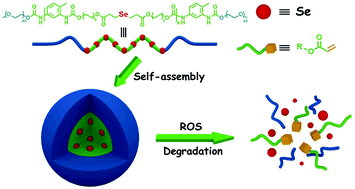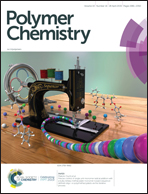ROS-triggered degradation of selenide-containing polymers based on selenoxide elimination†
Abstract
Synthetic degradable polymers for biomedical applications have drawn considerable attention because of the nonnegligible environmental pollution and bioaccumulation caused by nondegradable synthetic polymers. We developed a new degradable reactive oxygen species (ROS) responsive selenide-containing polymer that can depolymerize controllably through selenoxide elimination reactions. β-Selenylated carbonyl groups were employed in the main chains for oxidation induced degradation instead of the previous α-selenylated moiety. In the presence of ROS, the polymer would undergo controlled depolymerization via a cascade of intramolecular selenoxide elimination reactions. The degradation kinetics and mechanism were studied in detail by 1H nuclear magnetic resonance (NMR), gel permeation chromatography (GPC) and transmission electron microscopy (TEM). The full degradation of the hydrophobic block could be achieved with a tremendous change in self-assembled morphologies. This degradable polymer system provides new components for responsive programmable materials.



 Please wait while we load your content...
Please wait while we load your content...